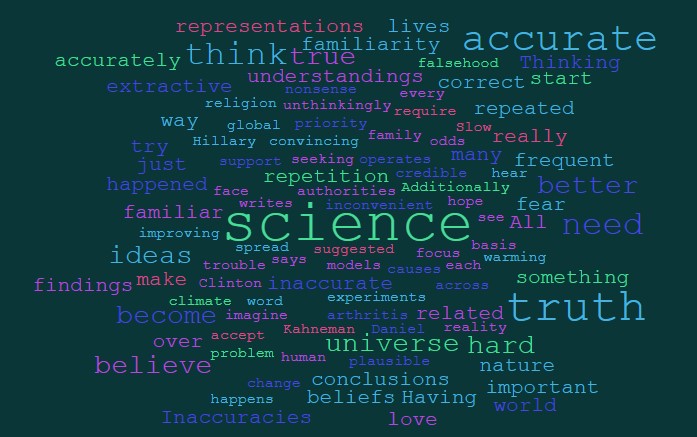People who wish to spread disinformation don’t have to try very hard to get people to believe that what they are saying is true, or that their BS at least has some element of truth to it. All it takes, is frequent repetition. “A reliable way to make people believe in falsehoods,” writes Daniel Kahneman in his book Thinking Fast and Slow, “is frequent repetition, because familiarity is not easily distinguished from truth.”
Having accurate and correct representations of the world feels important to me. I really love science. I listen to lots of science based podcasts, love sciency discussions with family members and friends, and enjoy reading science books. By accurately understanding how the world operates, by seeking to better understand the truth of the universe, and by developing better models and systems to represent the way nature works, I believe we can find a better future. I try not to fall unthinkingly into techno-utopianism thinking, but I do think that having accurate beliefs and understandings are important for improving the lives of people across the planet.
Unfortunately, for many people, I don’t think that accurate and correct understandings of the worlds have such high priority in their lives. I fear that religion and science may be incompatible or at odds with each other, and there may be a willingness to accept inaccurate science or beliefs to support religious doctrine. I also fear that people in extractive industries may discount science, preferring to hold an inaccurate belief that supports their ability to profit through their extractive practices. Additionally, the findings, conclusions, and recommendations from science may just be scary for many ordinary people, and accepting what science says might be inconvenient or might require changes in lifestyles that people don’t want to make. When we are in this situations, it isn’t hard to imagine why we might turn away from scientific consensus in favor of something comfortable but wrong.
And this is where accurate representations of the universe face and uphill battle. Inaccuracies don’t need to be convincing, don’t really need to sound plausible, and don’t need to to come from credible authorities. They just need to be repeated on a regular basis. When we hear something over and over, we start to become familiar with the argument, and we start to have trouble telling the truth and falsehood apart. This happened in 2016 when the number one word associated with Hillary Clinton was Emails. It happened with global warming when enough people suggested that human related CO2 emissions were not related to the climate change we see. And it happens every day in trite sayings and ideas from trickle down economics to popping your knuckles causes arthritis.
I don’t think that disproving inaccuracies is the best route to solving the problem of familiarity vs truth. I think the only thing we can hope to do is amplify those ideas, conclusions, experiments, and findings which accurately reflect the true nature of reality. We have to focus on what is true, not on all the misleading nonsense that gets repeated. We must repeat accurate statements about the universe so that they are what become familiar, rather than the mistaken ideas that become hard to distinguish from the truth.
